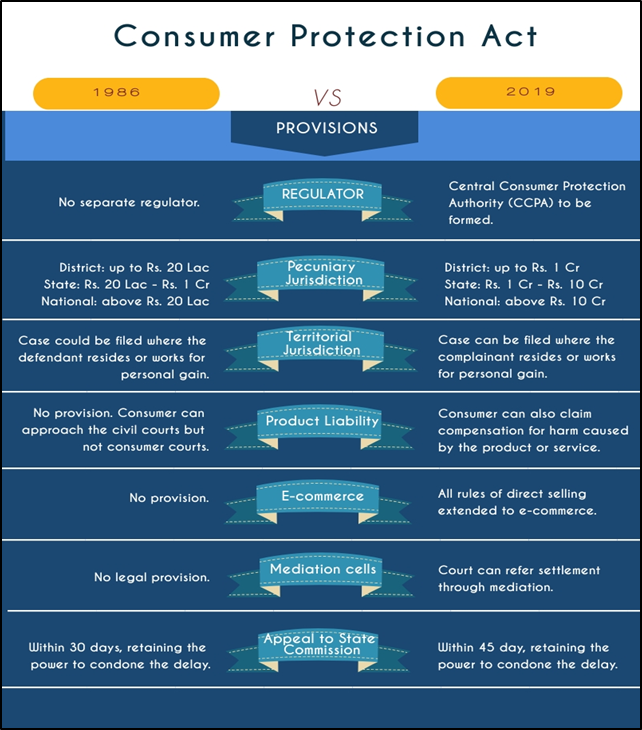In News:
- With rising consumer complaints, the Central Consumer Protection Authority (CCPA) has barred hotels and restaurants from levying service charges automatically or by default on food bills.
What’s in today’s article:
- Consumer Protection Act, 2019
- Service Charge (Meaning, Purpose, Nature)
- News Summary (CCPA guidelines, need for such guidelines)
Background:
- Service charge is used by restaurants/hotels to pay the staff and workers and is not charged for the experience or food served to consumer.
- Consumer Organizations observed that levying service charge is patently arbitrary and constitutes an unfair as well as restrictive trade practice under the Consumer Protection Act.
- Recently, Department of Consumer Affairs (DoCA) under the Ministry of Consumer Affairs had called a meeting with the National Restaurant Association of India (NRAI).
- It was regarding service charge levied by them on customers.
- It said that the restaurants are collecting service charges from consumers by default, even though collection of any such charge is voluntary.
Consumer Protection Act, 2019:

- The Consumer Protection Act, 2019 replaced the Consumer Protection Act, 1986, and seeks to widen its scope in addressing consumer concerns.
- The new Act recognises offences such as providing false information regarding the quality or quantity of a good or service, and misleading advertisements.
- It also specifies action to be taken if goods and services are found “dangerous, hazardous or unsafe”.
- The Act came into force in July 2020 and it will empower consumers and help them in protecting their rights through its various notified rules and provisions.
About Central Consumer Protection Authority (CCPA):
- The CCPA is a statutory body constituted under Section 10 of the Consumer Protection Act, 2019.
- Mandate: To protect the rights of the consumer by cracking down on unfair trade practices, and false and misleading advertisements that are detrimental to the interests of the public and consumers.
- Concerned Ministry: Ministry of Consumer Affairs, Food and Public Distribution
Powers & Functions of CCPA:
- To recall goods or withdrawal of services that are “dangerous, hazardous or unsafe”;
- Pass an order for refund the prices of goods or services so recalled to purchasers of such goods or services;
- Discontinuation of practices which are unfair and prejudicial to consumer’s interest;
- Impose penalties on manufacturers/endorsers/publishers of misleading advertisements.
Service Charge
- A service charge is a fee charged to customers for something specific.
- g., a bank charging a fee for using an ATM that's not part of its network or a vendor charging a fee for making a payment with a credit card.
- It also may be called a customer service fee or maintenance fee.
- Restaurants and hotels generally levy a service charge anywhere between 5 to 15 per cent on the food bill.
Nature of Service Charge in Restaurants/Hotels:
- While the GST is a mandatory component as per law, the service charge is supposed to be optional.
- It is the equivalent of what is known as gratuity around the world, or tip, in casual parlance.
- Most restaurants decide the service charge on their own, and print it at the bottom of the menu with an asterisk.
News Summary
- The guidelines, issued by the CCPA, said there should not be any collection of service charges by any other name.
- Further, the service charge cannot be collected by adding it along with the food bill and levying GST on the total amount.
Complaint in case of violation:
- If any consumer finds that a hotel or restaurant is levying a service charge in violation of the guidelines, he/she can request the concerned establishment to remove it from the bill amount.
- Consumers can also complain to the National Consumer Helpline (NCH), which works as an alternate dispute redressal mechanism at the pre-litigation level, by calling 1915 or through the NCH mobile app.
- They can also file complaints with the Consumer Commission. The complaint can be filed electronically through the e-Daakhil portal for its speedy and effective redressal.
- E-Daakhil is an online portal launched by the Indian the National Consumer Disputes Redressal Commission (NCDRC) in 2020.
- It was launched for the facilitation of offline and online complaints relating to the Consumer Protection Act, 2019 by consumers.









